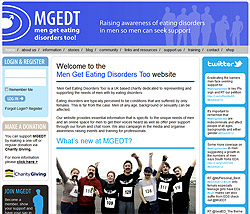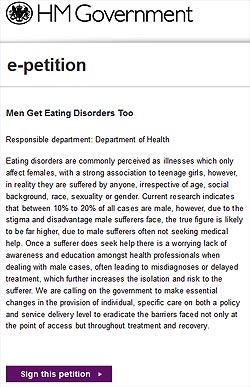Eating Disorders Awareness Week 2012 Raises Gender Issue
In a week dedicated to educating the public and raising awareness of eating disorders, campaign groups and organisations such as Body Gossip and Men Get Eating Disorders Too (MGEDT), know that the issue of gender plays an important part in the dialogue.
 Eating disorders in men, has by and large been ignored, with the general public as a result of the media, assuming that eating disorders only effect women. The facts are somewhat different of course.
Eating disorders in men, has by and large been ignored, with the general public as a result of the media, assuming that eating disorders only effect women. The facts are somewhat different of course.
The National Institute of Health and Clinical Excellence (NICE) guidelines on eating disorders showed that 1.6million people in the UK were affected by eating disorders in 2004 and 180,000 (11 per cent) of them were men. Other studies have suggested similar figures.
As stated on the MGEDT website: “In reality, eating disorders are conditions that are indiscriminate and can affect anyone of either gender.”
Body Gossip, are an organisation which is run by people who are passionate about positive body image, and work for free to spread their message. One of the most important things they do is to give presentations in schools and colleges throughout the UK aimed at both male and female teenagers between the ages of 14 and 18. They are proud of the fact that "Regardless of age, gender, race, culture, social background or sexual orientation, everyone has a body so everyone has a story and can contribute to the debate."
Whilst they are not entirely focused on eating disorders, their work does address some of the reasons for both male and female being effected by them.
Men Get Eating Disorders Too, is a charitable organisation that seeks to raise awareness of eating disorders in men so men are able to recognise their symptoms and access support when they need it.
Whilst both organisations see quite clearly that both men and women are affected by eating disorders, MGEDT are concentrating on the problem as it effects the male population.
Their website explains:
Between 10 and 25 per cent of those people experiencing eating disorders are male. We know that the majority of men who have eating disorders struggle to get access to appropriate support and treatment. Therefore it is difficult to know how many men are actually affected by the conditions.
 With regard to risk factors, MGEDT say on their website:
With regard to risk factors, MGEDT say on their website:
“Even though comparatively little research has been carried out on eating disorders in men, it does seem apparent that many of the commonly known risk factors are applicable. In particular the role of eating disorders being a coping mechanism, or an expression of, underlying emotional stress – this is applicable to males as much as it is females. This means any unresolved distress consequently presents a risk to developing eating problems.”
It then goes on to detail some of the main risk factors that can contribute toward men becoming effected by eating disorders:
They were overweight and/or teased about their size. Bullying seems to be a common experience for adults as well as children.
They are dieting – one of the most powerful eating disorder triggers in both males and females and as much as 70 per cent of young people will diet at one time.
They participate in the sport that demands a particular body build (thin or big). Runners or jockeys are at higher risk of developing an anorexia and bulimia, while footballers or weight lifters will focus on getting bigger (known as ‘bigorexia’). Wrestlers who try to shed pounds quickly before a match so they can compete in a lower weight category seem to be at special risk. Body builders are at risk if they deplete body fat and fluid reserves to achieve high definition.
They have a job or profession that demands thinness. Male models, actors, and general entertainers seem to be at higher risk than the general population. Some, but not all, male sufferers can be gay or bisexual. There is debate why the gay and bisexual male community is at particular risk but this may be partly because they are judged on attractiveness in the same way that women are in the heterosexual community. Fear of coming out and worry about rejection is also a possibility. In a study carried out by the Eating Disorder Association, they found that 20 per cent of male sufferers were gay making up twice the proportion of gay men in the population. However, a number of factors could contribute to the inaccuracy of this figure mainly being that it is possible that gay men are more likely to seek help than their straight male counterparts.
Some, but not all, male sufferers can be gay or bisexual. There is debate why the gay and bisexual male community is at particular risk but this may be partly because they are judged on attractiveness in the same way that women are in the heterosexual community. Fear of coming out and worry about rejection is also a possibility. In a study carried out by the Eating Disorder Association, they found that 20 per cent of male sufferers were gay making up twice the proportion of gay men in the population. However, a number of factors could contribute to the inaccuracy of this figure mainly being that it is possible that gay men are more likely to seek help than their straight male counterparts.
Living in a culture of fixed diets and physical appearance is also a risk factor. Male underwear models and men on the front pages of male fitness magazines and gay men’s press lead other males to compare themselves with these
so-called body types; so do ads for men's hair and skin care products. Weight loss and workout programmes as well as cosmetic surgery procedures, whose goal is chiselled muscularity can lead to the same sort of body dissatisfaction that afflicts women who read fashion magazines and watch movies and TV shows featuring so-called perfect people.
Research also continues to investigate if biological factors could also play a role. Numerous studies have investigated how genetics and hormonal links are two frequently explored areas of biological explanations of eating disorders. One biological factor that definitely does seem to have a definite link to the development of eating disorders is personality type. Some personality types, including obsessive-compulsive personalities, are much more susceptible to developing eating disorders than any other personality types.
MGEDT have just launched their petition in the media which aims to address inequalities around service provision, in-particular the barriers men face getting help from the point of access and in treatment services.
They hope that the petition to will both spark a debate and initiate key changes in services so that men’s specific needs are recognised and met.
Please sign and share this petition
Eating Disorders Awareness Week commences from 20th February.
See both www.bodygossip.org and www.mengetedstoo.co.uk for further information.
Source: Body Gossip / MGEDToo / BEAT




